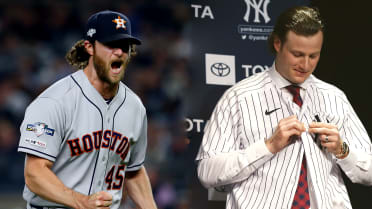Family, fans at heart of Piazza's Hall moment
COOPERSTOWN, N.Y. -- For 28 minutes, Mike Piazza kept a tissue wadded in the palm of his right hand, his fingers extended in a white-knuckle grip on the Clark Sports Center's wood-paneled podium. Behind him, roughly four dozen of baseball's greatest players sat rapt. In front of him, one of the three largest crowds in Hall of Fame history fanned themselves with cardboard cutouts of Piazza's face.
Thousands of them had made the four-hour trek across leafy back roads to Cooperstown, where on Sunday, Piazza and Ken Griffey Jr. officially entered the National Baseball Hall of Fame. As Piazza delivered his emotional, nearly half-hour speech, winding through his early life to his time with the Dodgers and beyond, he paused at the section regarding his Mets years. Fans began chanting his name. Out came the tissue, again, and not for the last time.
:: Complete Hall of Fame coverage ::
"You have given me the greatest gift, and graciously taken me into your family," Piazza said, directly addressing the crowd. "Looking out today at all the incredible sea of blue and orange brings back the greatest time of my life."
For Piazza, the sun-splashed afternoon fitted the capstone onto a 16-year career that saw him develop from a 62nd-round Draft pick, the lowest in Hall of Fame history, to one of the greatest-hitting catchers of all time. Now bronzed for future generations to see, Piazza's Hall of Fame plaque ticks off his 427 career homers, including a record 396 as a catcher, his 12 All-Star selections, his 1993 Rookie of the Year award, his 1996 All-Star MVP and his contributions to the Mets' 2000 National League pennant.
As notable as any of that, Piazza's plaque references the go-ahead home run he hit on Sept. 21, 2001, in New York City's first major sporting event following the Sept. 11 terrorist attacks. Often, Piazza has referred to that night as his signature moment with the Mets, a monumental reason why he chose to wear a Mets cap into the Hall.
"To witness the darkest evil of the human heart as it tore many loved ones from their families will forever be burned in my soul," Piazza said. "But from tragedy and sorrow came bravery, love, compassion, character and eventual healing."
Much of the first half of Piazza's speech centered on his early life growing up in suburban Pennsylvania, on his high school career and his years with the Dodgers. Piazza in particular thanked former manager Tommy Lasorda, a family friend and now fellow Hall of Famer who convinced the Dodgers to draft him with their final pick in 1988. Piazza teared up several times, before moving on to discuss his time with the Mets, then finally the Padres and A's.
• Piazza's proud pop watches son's call to Hall
Piazza talked about his relationships with Hall of Famers Mike Schmidt, a boyhood idol, and catcher Johnny Bench. He quoted Pope Benedict XVI and Theodore Roosevelt. He spoke about his high school coach and a smattering of professional teammates and instructors. Then he grew emotional as he thanked his family, addressing his father Vince in Italian with the phrase infinito grazie.
In the days and weeks leading up to his induction, Piazza anticipated emotion; the crumpled tissue did not make it into his hand by accident. After appearing on Jimmy Kimmel's talk show last week, Piazza even texted the comedian that he expected to cry at some point during his speech.
"Real men cry at funerals," Kimmel replied, "and when they get inducted into the Baseball Hall of Fame."
The joke is in the latter achievement's rarity. When Hall of Fame officials transported Piazza's plaque across town following the ceremony, he joined Tom Seaver as the second player ever to enter Cooperstown with a Mets cap on his plaque.
Like Seaver, Piazza will be remembered henceforth not as a Met or a Dodger but as a Hall of Famer. And, if he has his way, as a father, husband, son and businessman.
"Sharing it with my family was the most touching thing," Piazza said. "You don't go into the Hall of Fame alone."
Anthony DiComo has covered the Mets for MLB.com since 2008. Follow him on Twitter @AnthonyDiComo and Facebook, and listen to his podcast.



